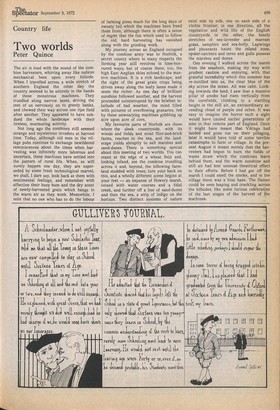Country life
Two worlds
Peter Quince
The air is loud with the sound of the combine harvesters, whirring away like outsize mechanical bees upon every hillside. When I travelled across a wide stretch of southern England the other day the country seemed to be entirely in the hands of these monstrous machines. They trundled along narrow lanes, driving the rest of us nervously on to grassy banks, and chewed their way across one ripe field after another. They appeared to have subdued the whole landscape with their tireless, murmuring activity.
Not long ago the combines still seemed strange and mysterious invaders at harvest time. Today, although old men in the village pubs continue to exchange bewildered reminiscences about the times when harvesting was infinitely more laborous and uncertain, these machines have settled into the pattern of rural life. When, as will surely happen one day, they are superseded by some fresh technological marvel, we shall, I dare say, look back at them with sentimental feelings, and remember with affection their busy hum and the dry scent of newly-harvested grain which hangs in the warm air as they work. Meanwhile, I note that no one who has to do the labour of farming pines much for the long days of sweaty toil which the machines have freed them from, although there is often a sense of regret that the fun which used to follow the old, hard harvesting has vanished along with the grinding work.
My journey across an England occupied by the combine army was to Norfolk, a secret county where in many respects the farming year still revolves in time-honoured ways; but of course there, too, the high East Anglian skies echoed to the massive machines. It is a rich landscape, and the sight of the great grain crops being driven away along the leafy lanes made it seem the richer. As one day of brilliant sunshine followed another, and the harvest proceeded uninterrupted by the briefest interlude of bad weather, the mind filled with pictures of overflowing granaries, fed by these unwearying machines gobbling up acre upon acre of corn.
My favourite parts of Norfolk are those where the sleek countryside, with its woods and fields and stout flint-and-brick farms, reaches to the sea, and the landscape yields abruptly to salt marshes and sand-dunes. There is something special about this meeting of two worlds. You can stand at the edge of a wheat field and, looking inland, see the combine trundling across it and, beyond, the billowing farmland studded with trees; turn your back on this, and a wholly different scene begins at your feet — an expanse of flowery marsh, veined with water courses and a tidal creek, and further off a line of sand-dunes and then the sea, a strip of indigo on the horizon. Two distinct systems of nature exist side by side, one on each side of a visible frontier; in one direction, all the vegetation and wild life of the English countryside, in the other, the lonely stretches of sea-lavender and marram grass, samphire and sea-holly. Lapwings and pheasants haunt the inland zone, oyster-catchers and terns and gulls possess the marshes and dunes.
One evening I walked across the marsh from the seashore, making my way with prudent caution and enjoying, with that grateful incredulity which this summer has re-instilled into us, the clear blue of the sky across the ocean. All was calm. Looking towards the land, I saw that a massive pillar of smoke had risen vertically from the cornfields, climbing to a startling height in the still air, an extraordinary ascending cloud of purple and ochre. It was easy to imagine the horror such a sight would have caused earlier generations of men in that remote part of England. Once it might have meant that Vikings had landed and gone out on their pillaging, later it would have told of some terrible catastrophe to farm or village. In the present August it meant merely that the harvesters had begun to burn the fields of waste straw which the combines leave behind them, and the warm sunshine and still air had lent unusual theatrical effect to their efforts. Before I had got off the marsh I could smell the smoke, and in tne village there was a blue haze. The flames could be seen leaping and crackling across the hillsides, like some furious celebration of the last stages of the harvest of the machines.










































 Previous page
Previous page